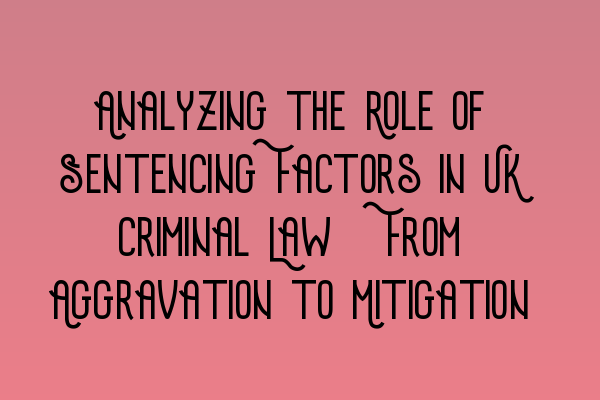Analyzing the Role of Sentencing Factors in UK Criminal Law: From Aggravation to Mitigation
As a leading law firm specializing in SQE Criminal Law & Practice in the UK, we understand the complexities and nuances of the criminal justice system. One crucial aspect of criminal law is the sentencing process, where various factors are taken into account to determine the appropriate punishment for an offender.
In this blog post, we will delve into the role of sentencing factors in UK criminal law, specifically focusing on aggravating and mitigating factors. Understanding these factors is essential for both legal professionals and individuals interested in criminal law, as they play a significant role in determining the outcome of a case.
The Significance of Sentencing Factors
Sentencing factors are crucial in criminal law as they guide judges in their decision-making process. When determining an appropriate sentence, judges consider a range of factors to ensure that it aligns with the principles of justice, proportionality, and deterrence.
Aggravating factors are those that heighten the severity of an offense, while mitigating factors are those that lessen the severity. These factors are considered to ensure fairness and consistency in sentencing, taking into account the unique circumstances of each case.
Analyzing Aggravating Factors
Aggravating factors are elements of a crime that make it more severe or reprehensible. They increase the level of culpability and, subsequently, the sentence imposed. Some commonly recognized aggravating factors in UK criminal law include:
- The use of violence
- Prior convictions
- The involvement of multiple victims
- The abuse of a position of trust
- Planning and premeditation
These factors serve to enhance the seriousness of the offense and may result in the imposition of a more severe sentence. It is important for legal professionals to identify and present relevant aggravating factors during a case to ensure a just outcome.
Understanding Mitigating Factors
Mitigating factors, on the other hand, are elements of a crime that reduce the level of culpability and the severity of the offense. By considering these factors, judges aim to balance the need for punishment with the recognition of mitigating circumstances. Some common mitigating factors in UK criminal law include:
- Genuine remorse
- A plea of guilty
- The defendant’s age or mental state
- Cooperation with the authorities
- Provocation or duress
These factors provide a more comprehensive picture of the defendant’s actions and help judges determine an appropriate sentence that takes into account the unique circumstances of the case.
The Role of Sentencing Guidelines
To ensure consistency in sentencing, UK courts rely on comprehensive guidelines issued by the Sentencing Council. These guidelines provide a consistent framework for judges to consider various factors when determining a sentence. They serve as a valuable resource for legal professionals and individuals seeking to understand the principles underlying criminal sentencing.
Additionally, staying updated with the latest developments in sentencing guidelines is crucial to ensure accurate advice and representation. Our SQE 1 Practice Exam Questions and SQE 1 Practice Mocks FLK1 FLK2 articles provide excellent resources for aspiring legal professionals to familiarize themselves with the complexities of criminal law.
Conclusion
Understanding the role of sentencing factors, such as aggravating and mitigating factors, is essential in the field of UK criminal law. These factors play a pivotal role in determining the appropriate punishment for offenders, ensuring fairness, and maintaining consistency in the justice system.
At SQE Criminal Law & Practice Law UK, we are committed to providing accurate and up-to-date information about various aspects of criminal law. Whether you are preparing for SQE 1 or SQE 2 exams or seeking comprehensive preparation courses, our SQE 1 Preparation Courses and SQE 2 Preparation Courses articles will guide you towards success.
For further information about SRA SQE exam dates and the latest updates in criminal law, visit our article on SRA SQE Exam Dates.
